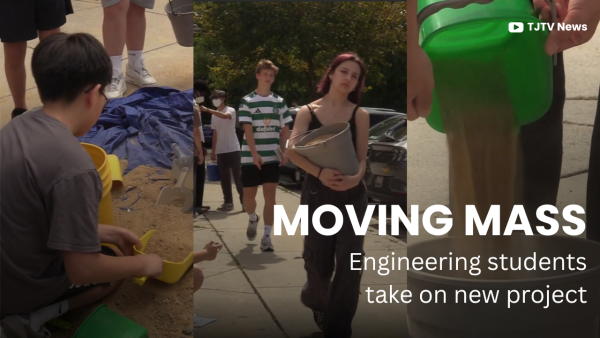Living positively
Biology teacher Aubrie Holman describes her experience contracting coronavirus
Holman and her daughter, Eliza, enjoy a day out after being quarantined for over a month. “From the moment we shut down in March, I just had this weird feeling that I was going to end up getting [the coronavirus]. There is a sense of relief now that it’s happened and I’m past it.”
In mid-October, IBET Biology and AP Biology teacher Aubrie Holman received a call that would change her way of life for months to come. The head of the daycare that her 23 month old daughter attended was potentially exposed to COVID-19. Holman and her family were advised to get tested immediately.
“It was a tertiary exposure,” Holman said. “One of the adults had been in touch with a person who had been in touch with a positive case. But a lot of parents and students right away started testing positive, which makes me think that this was probably within the daycare before this instance.”
Holman began to present with symptoms two days after the phone call: painful headaches, congestion, and severe fatigue. Three more days later, she and her daughter tested positive.
“It was kind of like the worst cold and worst flu I had ever had all rolled into one,” Holman said. “While I was at my sickest, it was difficult to do basic things, you know, walk down the stairs to get a meal.”
The presence of COVID-19 in the Holman household affected their day-to-day life. Holman’s husband did not initially test positive, and extra precaution was taken to prevent further spread of the virus.
“My husband and I started wearing masks around the house as soon as we knew that we were exposed,” Holman said. “Anytime I was on one floor of the house, he would go to another story of the house. Anytime we ate meals, we had windows open. And we all ate separately.”
Holman’s husband continued to test negative, but preventative measures took their toll on the family.
“It was just sad,” Holman said. “The lingering effect was just feeling so much more disconnected than we already felt in quarantine, and then not even being able to share a meal together. You just feel very isolated.”
Nonetheless, Holman found support around her and in the Jefferson community.
“Our neighbors took care of everything that they possibly could. They grocery shopped for us, and ordered us takeout, they were just awesome,” Holman said. “Ms. Geiger brought chicken noodle soup, and bread, and things that would help feed Eliza to make things easier for my husband.”
Holman’s experience with the virus taught her that contracting COVID-19 is not to be underestimated.
“[One of the] things that people aren’t thinking about until it happens to them is just how long you have to quarantine when it circulates to a family,” Holman said. “My husband had to quarantine for 14 days after I got out of quarantine, and my quarantine lasted 14 days plus the time when we were just quarantined because of our exposure. You are quarantined for over a month.”
Holman and her daughter have since made full recoveries. She emphasizes the importance of public health and keeping others safe.
“I have friends and family members that I’ve seen take their masks off for photo opportunities, and personally I wouldn’t choose to do that,” Holman said. “As a whole, our community does a really good job of taking things seriously. But you are risking the health of the other person and their whole family.”
Despite presenting with symptoms and having to take care of her daughter, Holman continued to teach her students. Her resilience and dedication is unquestionable.
“I’m not letting my behaviors change at all,” Holman said. “I continue wearing a mask, washing my hands, sanitizing things, everything I can to prevent further spread. We’re in control of our behavior and our behavior is what’s going to stop the spread or keep it going.”

![Holman and her daughter, Eliza, enjoy a day out after being quarantined for over a month. “From the moment we shut down in March, I just had this weird feeling that I was going to end up getting [the coronavirus]. There is a sense of relief now that it’s happened and I’m past it.”](https://www.tjtoday.org/wp-content/uploads/2020/12/Image-900x675.jpeg)


![A group of juniors play “Clash Royale” on their phones during lunch. Lunch is the only time when phones are allowed to be out. “I think once we adapt to it, it's not going to be something we miss because [for] everyone moving forward, that'll have been the policy [since] middle school,” DNA science and biology teacher Aubrie Holman said.](https://www.tjtoday.org/wp-content/uploads/2025/09/IMG_6621-2-e1758016994220-600x479.jpeg)
![Art therapist Katherine Pedrick and senior Viola Pande pose for a picture in front of the art therapy banner at the Children’s National Hospital’s annual Sunflower Festival, where Pande distributed the art kits that she made for her Gold Award. “Art is so multifaceted,” Pande said. “Even though I'm doing physical art— and I think physical art is really therapeutic because you are painting or coloring—art can come in many different forms. I’m combining music and physical art in [my Gold Award]. Music has been a really helpful form of therapy for me throughout my high school years and throughout my life in general because I can pour my energy into something that's not school. It’s also creating something [that isn’t] physical or visual.”](https://www.tjtoday.org/wp-content/uploads/2025/09/viola-image-406x600.jpeg)





